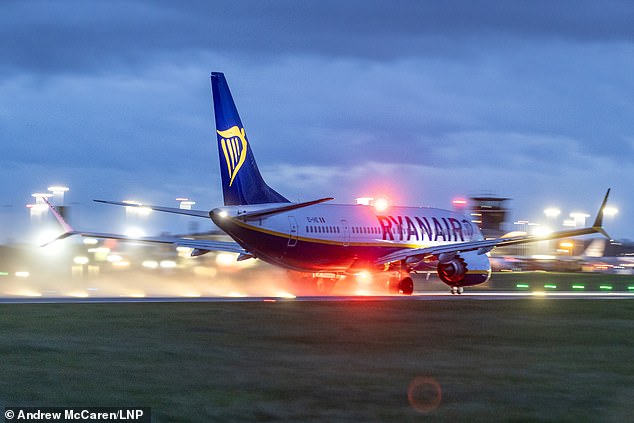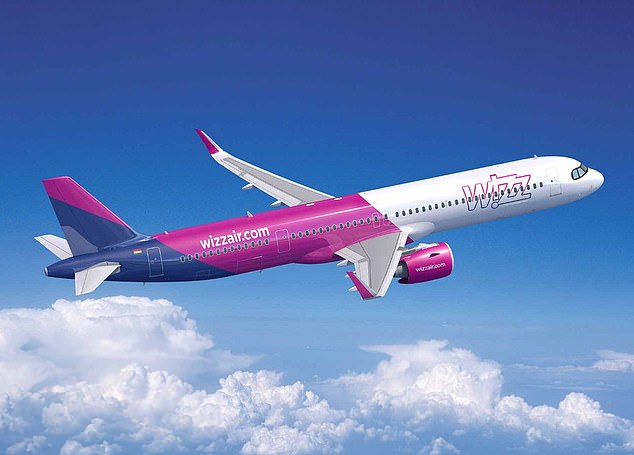Russia suspected of targeting thousands of British holiday flights in ‘extremely dangerous’ electronic attacks jamming systems including GPS
Russia is suspected of launching ‘extremely dangerous’ electronic attacks on thousands of British holiday flights, aviation sources have claimed.
The planes appear to suffer from GPS jamming and spoofing, which uses spoofing signals to trick pilots into believing the plane is in a different location than where they actually are.
The European Aviation Safety Agency warned in January that authorities had seen a “sharp increase” in the number of jamming and spoofing attacks, but did not say who was behind them.
But industry experts now claim that Putin’s forces are behind the attacks, with an insider saying so The sun that the ‘information from the Russians is false’.
The suggestion echoes that of an aide who reportedly blamed Russia for the “extremely irresponsible” attack that jammed an RAF plane as it flew through Poland with Defense Secretary Grant Shapps on board.
Russia is suspected of launching ‘extremely dangerous’ electronic attacks on thousands of British holiday flights, aviation sources have claimed
Aircraft logs revealed interference hotspots in the Baltic region, the Black Sea and the eastern Mediterranean, the newspaper reported.
The number of suspected Russian navigation attacks reached more than 350 per week last month, researchers claim, a significant increase from the fewer than 50 attacks per week recorded last year.
Between August and March, a reported 46,000 flights reported satellite navigation (satnav) problems over the Baltic region.
This included 2,309 Ryanair flights, 1,368 Wizz Air flights, 82 British Airways flights and four EasyJet flights.
Seven TUI aircraft – which reportedly do not fly in the Baltic Sea – reported problems with navigation. The airline said the affected planes were “likely operating flights without passengers.”
Virgin Atlantic, which also does not fly through the region, was the only major British airline not affected by the electronic attacks.

In the eight months leading up to March, a reported 46,000 planes recorded satellite navigation problems over the Baltic region – including 2,309 Ryanair flights, researchers claim (stock photo)
In a statement to the Sun, EasyJet said it has put in place procedures to ‘mitigate GPS issues’.
Similarly, Ryanair told the newspaper: ‘If location systems, such as GPS, fail to function, the crew switches to alternative systems.’
Experts note that a “significant percentage” of aircraft reporting “low navigation accuracy” “appeared to correlate well with areas of known and suspected disruptions.”
Dr. Jack Watling, a war expert at the think tank RUSI, told The Sun that Russia has “long used GPS jamming as an intimidation tool” and that the country is “projecting it beyond NATO’s borders.”
“Wherever there is a large Russian garrison you see GPS denial and there is one in Kaliningrad,” he said. “They just turned that stuff on because there are standing orders.”
Defense officials have previously accused Moscow of jamming GPS signals over the RAF Akrotiri base in Cyprus.

Industry experts now claim that Putin’s forces are behind the jamming and spoofing attacks. It is believed that 1,368 Wizz Air flights were affected by navigation problems between August and March (stock photo)
Despite the suspected Russian satnav attacks, the UK Civil Aviation Authority (CAA) continues to insist that flying is safe, noting that several ‘protocols exist to protect navigation systems on board commercial aircraft’.
A spokesperson told the newspaper: ‘GPS jamming does not directly affect an aircraft’s navigation and although it is a known problem, it does not mean that an aircraft has been deliberately stuck.
‘While operators have put in place measures to ensure continued safe operations, we are working closely with other aviation regulators, airlines and aircraft manufacturers to mitigate and mitigate the risks of jamming and continuously monitor incidents worldwide.’
MailOnline has contacted the CAA, WizzAir, Ryanair, EasyJet, TUI, Virgin Atlantic and BA for comment.
